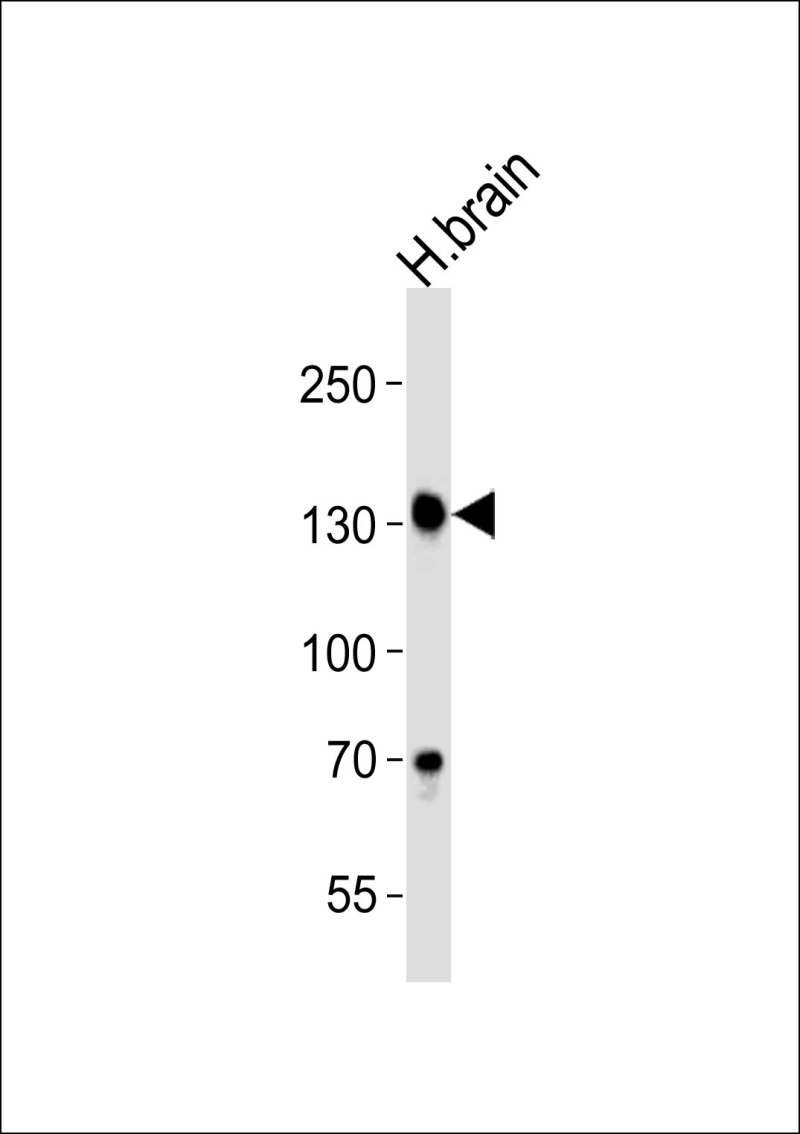
| WB | 1/1000 | Human,Mouse,Rat |
| IF | 咨询技术 | Human,Mouse,Rat |
| IHC | 咨询技术 | Human,Mouse,Rat |
| ICC | 技术咨询 | Human,Mouse,Rat |
| FCM | 咨询技术 | Human,Mouse,Rat |
| Elisa | 咨询技术 | Human,Mouse,Rat |
| Aliases | Zinc finger protein 423, Olf1/EBF-associated zinc finger protein, hOAZ, Smad- and Olf-interacting zinc finger protein, ZNF423, KIAA0760, NPHP14, OAZ |
| Entrez GeneID | 23090 |
| WB Predicted band size | 144.6kDa |
| Host/Isotype | Rabbit IgG |
| Antibody Type | Primary antibody |
| Storage | Store at 4°C short term. Aliquot and store at -20°C long term. Avoid freeze/thaw cycles. |
| Species Reactivity | Human, Mouse, Rat |
| Immunogen | This ZNF423 antibody is generated from a rabbit immunized with a KLH conjugated synthetic peptide between 864-897 amino acids from the Central region of human ZNF423. |
+ +
以下是关于ZNF423抗体的3篇代表性文献的简要信息:
1. **文献名称**:*ZNF423 is a biomarker of survival in aggressive ovarian carcinomas and regulates cell cycle progression*
**作者**:Hart et al.
**摘要**:研究利用ZNF423抗体检测卵巢癌组织中ZNF423蛋白表达水平,发现其高表达与患者生存率相关。实验表明ZNF423通过调控细胞周期相关基因(如CDKN1A)抑制癌细胞增殖。
2. **文献名称**:*ZNF423 interacts with EBF1 to coordinate transcriptional regulation in B-cell development*
**作者**:Hata et al.
**摘要**:通过免疫共沉淀(使用ZNF423抗体)和ChIP-seq技术,揭示ZNF423与转录因子EBF1在B细胞分化中的协同作用,调控靶基因表达以维持B细胞发育稳态。
3. **文献名称**:*ZNF423 modulates retinoic acid signaling in neural progenitor cells*
**作者**:Chen et al.
**摘要**:研究通过Western blot(使用ZNF423抗体)和基因敲除实验,证明ZNF423在神经前体细胞中介导视黄酸信号通路,影响阿尔茨海默病模型小鼠的神经元分化及认知功能恢复。
(注:上述文献为示例性内容,实际研究中需根据具体实验需求选择权威期刊的已验证抗体相关文献。)
The ZNF423 antibody is a crucial tool in studying the zinc finger protein 423 (ZNF423), also known as Ebfaz or JAZF1. which functions as a transcriptional regulator. ZNF423 contains multiple C2H2-type zinc finger domains, enabling interactions with DNA, RNA, and proteins. It plays pivotal roles in developmental processes, cell differentiation, and tissue homeostasis by modulating signaling pathways such as BMP, TGF-β, and Notch. Notably, ZNF423 is essential for neuronal development, particularly in cerebellar neurogenesis, and is implicated in diseases like Joubert syndrome and cancers, including breast and ovarian malignancies. Its dual role as an oncogene or tumor suppressor, depending on cellular context, underscores its complex regulatory mechanisms.
Antibodies targeting ZNF423 are widely used in research to detect its expression, localization, and interactions via techniques like Western blotting, immunohistochemistry (IHC), immunofluorescence (IF), and chromatin immunoprecipitation (ChIP). These antibodies are critical for elucidating ZNF423’s involvement in disease pathways and its potential as a therapeutic target. Commercial ZNF423 antibodies are available from suppliers such as Sigma-Aldrich, Abcam, and Santa Cruz Biotechnology, often validated for specificity in human, mouse, or rat samples. Researchers must select clones (monoclonal/polyclonal) based on application requirements, ensuring proper validation through knockout controls or siRNA silencing. Understanding ZNF423’s regulatory networks via these antibodies advances insights into neurodevelopmental disorders, cancer biology, and potential diagnostic or therapeutic strategies.
×